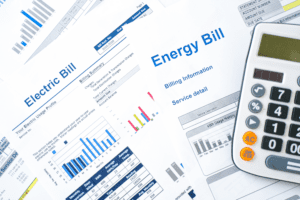
7 Sneaky Reasons Your Energy Bill May be Increasing
Energy bills can be a significant household expense, and unexpected increases can cause both confusion and concern. Understanding the factors that contribute to rising costs can help homeowners identify solutions and manage expenses more effectively. This blog explores seven sneaky reasons your energy bill may be on the rise, including a detailed look at how an inefficient Heating, Ventilation, and Air Conditioning (HVAC) system can impact your wallet.
Understanding Your Energy Bill
Before diving into the reasons behind increasing energy bills, it’s crucial to grasp the basics of what your bill entails. Energy bills are more than just a monthly annoyance; they’re a summary of your household’s energy consumption, presented through various charges and terms that can sometimes be difficult to decipher.
Common Terms and Their Meanings
- Kilowatt-hour (kWh): The standard unit of measurement for electricity usage. Your energy consumption is calculated by the number of kWh used during the billing period.
- Fixed and Variable Charges: Fixed charges remain constant each billing cycle, while variable charges depend on your energy usage.
- Tariffs: These are the rates charged per kWh used and can vary based on your energy provider and the type of plan you have.
Reading and Interpreting Your Bill
To identify unusual increases in your bill, compare the kWh used in the current billing period to previous periods. Look for significant changes in consumption or cost per kWh, as these can indicate underlying issues causing your bill to rise.
Spotting Unusual Increases
An increase in energy consumption might not always be due to changes in your habits. Seasonal variations, such as the need for heating or cooling, can naturally lead to higher bills. However, persistent or unexplained increases warrant a closer investigation into potential causes, including the efficiency of your HVAC system.

1. Inefficient HVAC System (Need for Replacement or Repair)
Heating, Ventilation, and Air Conditioning (HVAC) systems play a pivotal role in maintaining the comfort of your home. They also account for a significant portion of your energy bill. An inefficient HVAC system can be a major culprit behind rising energy costs, often sneaking up on homeowners who might not immediately connect their increased bills to HVAC issues.
Signs Your HVAC System Needs Attention
- Unusual Noises: Strange sounds coming from your HVAC system can indicate mechanical problems that may be causing inefficiency.
- Poor Performance: If your home isn’t reaching the desired temperature, or if it takes longer than usual, your system might be struggling.
- Increased Energy Bills: A sudden spike in your energy bills, without a corresponding increase in usage, suggests that your HVAC system is working harder than it should to maintain comfort levels.
Repair vs. Replacement: Factors to Consider
- Cost: Initially, repair might seem less expensive than replacement. However, frequent repairs and higher energy costs can make HVAC replacement the more cost-effective option in the long run.
- Age of the System: The lifespan of an HVAC system is typically around 15-20 years. If your system is nearing or beyond this age, replacement might be more economical, considering newer models are more energy-efficient.
- Efficiency Ratings: Modern HVAC systems have higher efficiency ratings. Upgrading to a more efficient model can significantly reduce your energy consumption and costs.
Making the decision to repair or replace can be challenging, but considering these factors can help. Sometimes, investing in a new, energy-efficient system can offer long-term savings and improve the comfort of your home.
Improving HVAC Efficiency
If replacement isn’t immediately feasible, there are steps you can take to improve the efficiency of your existing system:
- Regular Maintenance: Ensure your HVAC system is serviced regularly to keep it running efficiently.
- Change Filters Regularly: Dirty filters restrict airflow, causing the system to work harder. Changing filters regularly can improve efficiency.
- Thermostat Settings: Using programmable thermostats to adjust the temperature when you’re not home can reduce unnecessary energy consumption.
By addressing HVAC inefficiencies, you can achieve significant energy savings. This focus on maintaining and potentially upgrading your HVAC system not only reduces energy bills but also enhances the overall comfort and value of your home.
The energy efficiency of your home is influenced by several factors beyond the HVAC system. Poor home insulation, leaky windows and doors, outdated appliances, phantom load, high energy consumption during peak hours, and not utilizing energy-saving settings are additional reasons your energy bills may be creeping up. Each of these areas offers opportunities for improvement to reduce your energy consumption and save money.


2. Poor Home Insulation
Home insulation plays a critical role in maintaining your home’s temperature, keeping it warm in the winter and cool in the summer. Insufficient insulation leads to significant energy loss, forcing your HVAC system to work overtime and driving up your energy bills.
Identifying Insulation Issues
- Unusually high heating or cooling bills: This could indicate that air is escaping from your home.
- Cold floors, walls, and ceilings: These are signs that heat is escaping during the winter.
- Overly hot rooms in summer: Poor insulation can also mean heat is entering your home during warmer months.
Improving Home Insulation
- Attic insulation: Since heat rises, one of the most effective ways to retain heat in the winter (and keep your home cool in the summer) is to ensure your attic is properly insulated.
- Wall insulation: Adding insulation to your walls can significantly reduce energy loss.
- Seal leaks: Use caulk or foam to seal leaks around windows, doors, and other areas where air might escape.
Improving your home’s insulation can have an immediate impact on your energy bills by reducing the need for heating and cooling and maintaining a comfortable temperature more efficiently.
3. Leaky Windows and Doors
Drafty windows and doors can be as detrimental to your energy efficiency as poor insulation. Even small leaks can lead to significant energy loss.
How to Detect Air Leaks
- Visual inspection: Look for gaps and cracks in the frames of windows and doors.
- Hand test: Feel around windows and doors for drafts.
- Candle test: Hold a lit candle close to window and door frames; flickering of the flame may indicate air leaks.
Simple Fixes and Improvements
- Weatherstripping: This is an easy and cost-effective way to seal leaks around movable components like doors and window sashes.
- Caulking: Use caulk to seal leaks in non-movable parts of windows and doors.
- Window treatments: Heavy curtains can also help reduce energy loss, though they are more of a temporary solution.
Addressing leaks not only improves your home’s energy efficiency but also its comfort, preventing cold drafts in the winter and heat ingress in the summer.


4. Outdated Appliances
Older appliances are generally less energy-efficient than their modern counterparts. An outdated HVAC system, refrigerator, washer, or dryer could be consuming far more energy than necessary.
Benefits of Upgrading to Energy-Efficient Models
- Lower energy bills: Energy-efficient appliances use less electricity to operate, leading to lower energy costs.
- Improved performance: Newer models often perform better and offer more features.
- Environmental impact: Using less energy reduces your carbon footprint.
Look for appliances with the ENERGY STAR label, indicating they meet energy efficiency guidelines set by the U.S. Environmental Protection Agency.
5. Phantom Load
Phantom load, or standby power, is the energy consumed by appliances and electronics when they are turned off but still plugged in. This hidden energy use can add up.
Reducing Phantom Load
- Unplug unused appliances: Simple but effective, especially for items like chargers, toasters, and coffee makers that don’t need to be plugged in 24/7.
- Use power strips: Power strips allow you to easily cut off power to multiple devices at once, making it easier to manage phantom loads.
- Upgrade to smart plugs: Smart plugs can be controlled remotely, allowing you to turn off power to devices even when you’re not home.
6. High Energy Consumption in Peak Hours
Energy costs can vary throughout the day, with peak hours typically occurring when demand is highest. Using appliances during these times can be more expensive.
Tips for Shifting Energy Usage to Off-Peak Hours
- Run appliances at night: Dishwashers, washing machines, and dryers can be used during off-peak hours to reduce energy costs.
- Programmable thermostats: Adjust heating and cooling to lower settings during peak hours when you may not be home.



7. Not Utilizing Energy-Saving Settings on Appliances and Systems
Many modern appliances and systems come with energy-saving settings designed to minimize energy consumption without sacrificing performance.
- Explore settings: Familiarize yourself with the energy-saving options on your appliances.
- Use eco-modes: Selecting eco-mode on appliances like dishwashers and washing machines can lead to energy savings.
Energy efficiency is crucial for both environmental conservation and managing household expenses. By understanding your energy bill and addressing the sneaky reasons behind increases, you can take proactive steps towards a more sustainable home. Whether it’s through upgrading your HVAC system, improving home insulation, or simply changing your energy usage habits, each action contributes to a significant reduction in energy consumption and costs. Start with the area where you can make the most impact and gradually work your way through your home’s energy inefficiencies. The road to a more energy-efficient home is a journey worth taking, leading not only to savings but also to a healthier planet for future generations.




Leave a Reply